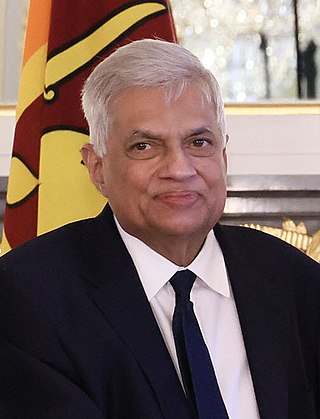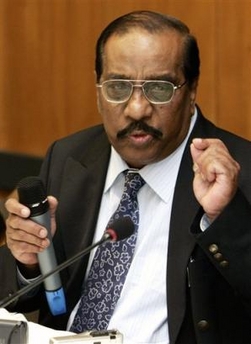
The Liberation Tigers of Tamil Eelam was a Tamil militant organization that was based in northeastern Sri Lanka.

The Sri Lankan Civil War was a civil war fought in Sri Lanka from 1983 to 2009. Beginning on 23 July 1983, it was an intermittent insurgency against the government by the Velupillai Prabhakaran-led Liberation Tigers of Tamil Eelam. The LTTE fought to create an independent Tamil state called Tamil Eelam in the north-east of the island, due to the continuous discrimination and violent persecution against Sri Lankan Tamils by the Sinhalese-dominated Sri Lanka government.

Ranil Wickremesinghe is a Sri Lankan politician who is the 8th and current president of Sri Lanka. He also holds several ministerial positions, including the Minister of Finance, Minister of Defence, Minister of Technology and Minister of Women, Child Affairs and Social Empowerment.

Velupillai Prabhakaran, was an Eelam Tamil revolutionary. Prabhakaran was a major figure of Tamil nationalism, and the founder and leader of the Liberation Tigers of Tamil Eelam (LTTE). The LTTE was a militant organization that sought to create an independent Tamil state in the north and east of Sri Lanka in reaction to the oppression of the country's Tamil population by the Sri Lankan government. Under his direction, the LTTE undertook a military campaign against the Sri Lankan government for more than 25 years.
The Indo-Sri Lanka Peace Accord was an accord signed in Colombo on 29 July 1987, between Indian Prime Minister Rajiv Gandhi and Sri Lankan President J. R. Jayewardene. The accord was expected to resolve the Sri Lankan Civil War by enabling the thirteenth Amendment to the Constitution of Sri Lanka and the Provincial Councils Act of 1987. Under the terms of the agreement, Colombo agreed to a devolution of power to the provinces, the Sri Lankan troops were to be withdrawn to their barracks in the north and the Tamil rebels were to surrender their arms.

Anton Balasingham Stanislaus was a Sri Lankan Tamil journalist, rebel and chief political strategist and chief negotiator for the Liberation Tigers of Tamil Eelam, a separatist Tamil militant organisation in Sri Lanka.
Vinayagamoorthy Muralitharan is a Sri Lankan politician and former militant. Formerly a fighter for the Tamil separatist group, the Liberation Tigers of Tamil Eelam (LTTE), for over 20 years, Muralitharan later rose to prominence after defecting from the LTTE and forming the Tamil Makkal Viduthalai Pulikal (TMVP), a breakaway faction of the LTTE.

Shanmugalingam Sivashankar was a Sri Lankan Tamil rebel and leading member of the Liberation Tigers of Tamil Eelam, a separatist Tamil militant organisation in Sri Lanka.
Seyed Ali Zahir Moulana is a Sri Lankan politician, former diplomat and local government activist. He is most known for the pivotal and important role he played in bringing about an end to the Sri Lankan Civil War.

TamilNet is an online newspaper that provides news and feature articles on current affairs in Sri Lanka, specifically related to the erstwhile Sri Lankan Civil War. The website was formed by members of the Sri Lankan Tamil community residing in the United States and publishes articles in English, German and French.
Suppayya Paramu Thamilselvan, commonly known as S. P. Tamilselvan,, was the leader of the political wing of the Liberation Tigers of Tamil Eelam, an organisation fighting for a separate state for the ethnic Tamil minority in the north and east of Sri Lanka from majority Sinhalese government. He was a prominent negotiator and one of the closest associates of LTTE leader Velupillai Prabhakaran.
Militant use of children in Sri Lanka has been an internationally recognized problem since the inception of the Sri Lankan civil war in 1983. The primary recruiters of under the age of 18 children are the rebel LTTE movement and the Karuna group, a break-away faction of the LTTE working with Sri Lanka Forces. Human Rights Watch criticized that threats and intimidation were used by the LTTE to force Tamil families in Sri Lanka to furnish children for military duty. When families reject, their children are sometimes kidnapped at night from their homes or forced recruited while walking to school. Parents who refuse to allow their children to be recruited suffer retaliation by the Tamil Tigers, which may include violence or detention.

Eelam War IV is the name given to the fourth phase of armed conflict between the Sri Lankan military and the separatist Liberation Tigers of Tamil Eelam (LTTE). Renewed hostilities began on the 26 July 2006, when Sri Lanka Air Force fighter jets bombed several LTTE camps around Mavil Aru anicut. The government's casus belli was that the LTTE had cut off the water supply to surrounding paddy fields in the area. Shutting down the sluice gates of the Mavil Aru on July 21 depriving the water to over 15,000 people - Sinhalese and Muslim settlers under Sri Lankan state-sponsored colonisation schemes in Trincomalee district. They were denied of water for drinking and also cultivating over 30,000 acres of paddy and other crops. The fighting resumed after a four-year ceasefire between the Government of Sri Lanka (GoSL) and LTTE. Continued fighting led to several territorial gains for the Sri Lankan Army, including the capture of Sampur, Vakarai and other parts of the east. The war took on an added dimension when the LTTE Air Tigers bombed Katunayake airbase on March 26, 2007, the first rebel air attack without external assistance in history.
The Interim Self Governing Authority (ISGA) was a proposal issued in October 2003 by the rebel Liberation Tigers of Tamil Eelam (LTTE) of Sri Lanka for power sharing in the north and east of Sri Lanka. The proposals were made in-lieu of the LTTE renouncing its claim for an independent country called Tamil Eelam for the minority Sri Lankan Tamil people.

The Battle of Mullaitivu was a land battle fought between the Sri Lankan Military and the Liberation Tigers of Tamil Eelam (LTTE) for the control of the town of Mullaitivu in the Northern Theater of Eelam War IV during the Sri Lankan civil war. The town of Mullaitivu was the last stronghold of the LTTE. The government declared on 25 January 2009 that its troops had entered the town and were consolidating their positions.
Perinpanayagam Sivaparan is a Sri Lankan Tamil rebel and leading member of the Liberation Tigers of Tamil Eelam (LTTE), a separatist Tamil militant organisation in Sri Lanka.
The Indian intervention in the Sri Lankan Civil War was the deployment of the Indian Peace Keeping Force in Sri Lanka intended to perform a peacekeeping role. The deployment followed the Indo-Sri Lankan Accord between India and Sri Lanka of 1987 which was intended to end the Sri Lankan Civil War between militant Sri Lankan Tamil nationalists, principally the Liberation Tigers of Tamil Eelam (LTTE), and the Sri Lankan military.
Content from the United States diplomatic cables leak has depicted Sri Lanka and related subjects extensively. The leak, which began on 28 November 2010, occurred when the website of WikiLeaks—an international new media non-profit organisation that publishes submissions of otherwise unavailable documents from anonymous news sources and news leaks—started to publish classified documents of detailed correspondence—diplomatic cables—between the United States Department of State and its diplomatic missions around the world. Since the initial release date, WikiLeaks is releasing further documents every day. 3,166 of the 251,287 diplomatic cables obtained by WikiLeaks are from the US Embassy in Colombo, Sri Lanka.
Reactions to the end of the Sri Lankan Civil War on 18 May 2009 have generally been positive and welcoming, while some countries expressed concern over the civilian casualties and the humanitarian impact.
Terrorism in Sri Lanka has been a highly destructive phenomenon during the periods of the Sri Lankan Civil War (1983–2009) and the first and second JVP insurrections. A common definition of terrorism is the systematic use or threatened use of violence to intimidate a population or government for political, religious, or ideological goals. Sri Lanka is a country that has experienced some of the worst known acts of modern terrorism, such as suicide bombings, massacres of civilians and assassination of political and social leaders, that posed a significant threat to the society, economy and development of the country. The Prevention of Terrorism Act of 1978 is the legislation, that provides the powers to law enforcement officers to deal with issues related to terrorism in Sri Lanka. It was first enacted as a temporary law in 1979 under the presidency of J. R. Jayewardene, and later made permanent in 1982.








